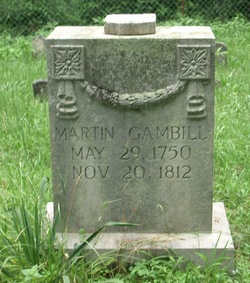
| Martin Gambill 1750-1812 | |||||||||||||
| From Find-A-Grave; Daniel W. Barefoot says he rode two horses to death in the 100 mile 24 hour ride to alert Patriots of Ferguson's advance. | |||||||||||||
Revolutionary War Military Hero, Martin Gambill, is credited with bringing some 350 Over Mountain Men to the battle of Kings Mountain by riding through the country on a desperate 24 hour mission, informing the settlers that the British army was advancing their way, the English leader having issued a broadside threatening to lay waste to the settlers' homes and farms and hang all the Rebel leaders. British Colonel Ferguson thought he had found the perfect defensible spot on top of a small mountain. But his men were unable to defend themselves against the rough and tumble Scots-Irish settlers. The October 7, 1780 defeat of the English forces in this one battle is credited with turning the tide of the Revolutionary War, thus leading to General Cornwallis's later surrender. In The Winning of the West, Theodore Roosevelt wrote of Kings Mountain, "This brilliant victory marked the turning point of the American Revolution." Martin Gambill, son of Henry and Mary Gambill, had been in active service 4 or 5 years previously, serving under Campbell and Colonel Benjamin Cleveland. In 1768, Martin Gambill, at the age of eighteen, learned that a group in North Carolina, calling themselves 'Regulators' was offering armed resistance to British laws and he decided to join them. Riding his horse to North Carolina in 1768 he enlisted with the Regulators in Rowan County and participated in several skirmishes against the Tory militia of Governor Tryon . Badly defeated at Alamance in Orange County many of the survivors, including Martin Gambill, were forced to flee to the western mountains. Injured in the Battle of Kings Mountain and discharged, Martin and his wife, Nancy (Nall) Gambill, made their home on the South Fork of New River in what later became Ashe County. He served as Justice of the Peace, Sheriff, Tax Collector, and Representative to the North Carolina Legislature. | |||||||||||||
No comments:
Post a Comment